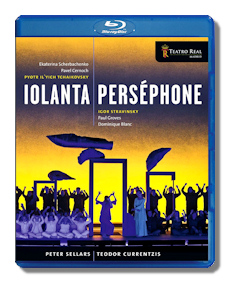
The Internet's Premier Classical Music Source
Related Links
-
Stravinsky Reviews
Tchaikovsky Reviews - Latest Reviews
- More Reviews
-
By Composer
-
Collections
DVD & Blu-ray
Books
Concert Reviews
Articles/Interviews
Software
Audio
Search Amazon
Recommended Links
Site News
 Blu-ray Review
Blu-ray Review
Russian Theater Works

- Piotr Ilyitch Tchaikovsky: Iolanta
- Iolanta - Ekaterina Scherbachenko
- Robert - Alexej Markov
- Vaudémont - Pavel Cernoch
- King René - Dmitry Ulianov
- Ibn-Hakia - Willard White
- Alméric - Vasily Efimov
- Bertrand - Pavel Kudinov
- Marta - Ekaterina Semenchuk
- Brigitta - Irina Churilova
- Laura - Letitia Singleton
- Igor Stravinsky: Perséphone *
- Perséphone - Dominique Blanc
- Eumolpe - Paul Groves
- Dancers
- Perséphone - Sam Sathya
- Demeter - Chumvan Sodhachivy
- Pluton - Khon Chansithyka
- Mercure, Demophoon, Triptoleme - Nam Narim
* Dancers - Amrita Performing Arts, Cambodia
Teatro Real Chorus & Orchestra/Teodor Currentzis
Stage Director - Peter Sellars
Set Designer - George Tsypin
Costume Designers - Martin Pakledinaz & Helen Siebrits
Lighting Designer - James F. Ingalls
Bonus Feature: In search of the light - Peter Sellars shares insights on the two works
Teatro Real Blu-ray TR97010BD 187m LPCM Stereo DTS HD Master Audio
Also available on DVD TR97011: Amazon - UK - Germany - Canada - France - Japan - ArkivMusic - CD Universe - JPC
These are minimalist productions of Tchaikovsky's one-act opera Iolanta and Stravinsky's composite-theater work Perséphone. Both formed a double bill at Madrid's Teatro Real on January 21 and 24, 2012 where they were recorded live for release here on the opera house's own label. The well-known stage director Peter Sellars uses the same sets for both works, and they consist merely of several wood structures resembling door or picture frames, which among other things serve as portals. Generally the lighting is rather sparing in Iolanta and although things are initially brighter in Perséphone, that too is mostly a darkish treatment. Costuming places the works in the 21st century.
From these descriptions some potential buyers might be scared off. But I can only say they would miss out on splendid singing in the Tchaikovsky and excellent dancing and choreography, as well as fine singing, in the Stravinsky.
The Tchaikovsky features the ravishing singing of relative newcomer Ekaterina Scherbachenko as Iolanta. Scherbachenko made her major debut at La Scala as Liu in Turandot in 2011. Here she is lovely in the role of Princess Iolanta who is blind from birth but in the end gains the ability to see. There is so much to admire in the singing and dramatic skills of Scherbachenko, and for that matter, the whole cast. Right from the beginning your eyes are glued to the screen and your ears are enchanted by Scherbachenko's voice. After the orchestral introduction, which is scored for winds (no strings – because Tchaikovsky wanted to symbolize Iolanta's blindness by muting part of the orchestra), Scherbachenko immediately captures your attention, not least because of her physical beauty. Soon you hear her passionate rendition of Otchego eto prezhde. The lovely trio Spi, pust' ang'ely krylami is beautifully sung by Ekaterina Semenchuk, Irina Churilova and Letitia Singleton. I recall that in the older and very good Mark Ermler-led Melodiya recording, from about 1976, this number was sung more vigorously and with less delicacy. Here the subdued singing is about as perfect as you could want. Truly, this is one of the highlights of this performance! Yet, there is so much more. The male singers are strong throughout: to cite just one highlight, try Dmitry Ulianov's brilliant and passionately committed Chto skazhet on?
Let me add that included in this production is part of Tchaikovsky's Hymn of the Cherubim, which is used in Scene Nine (track 20). I'm not sure it quite fits, but the a capella singing is beautiful and so who would want to complain about this extra morsel? I could go on with more lavish praise, but let me just say that this production features some of the finest singing in this opera that you're likely to hear. Moreover, Teodor Currentzis draws a spirited performance from the orchestra and chorus. Camera work and sound reproduction are excellent.
As for the Stravinsky, the two singers are just fine, but it is the dancing and choreography that will catch your eye. The dancers are from Amrita Performing Arts, an organization based in Phenom Penh that promotes Cambodia's contemporary dance and theater. Everything in this production has a modern feel about it, from the often glacial pacing and hypnotic manner of the dancers to the ethereal sounds of the chorus and the often blue backgrounds of the sets. While some might object to such a treatment in the Tchaikovsky, it is quite appropriate in this Stravinsky work. After all, Perséphone is a neo-Classical piece, sparsely scored, airy, a bit reserved and dry, and featuring no catchy melodies or lush sonorities. It reminds me of a sort of laid-back cousin of Oedipus Rex. Again, Maestro Currentzis leads the orchestra with a knowing hand. The sound and camera work are splendid.
While it is certainly true that some who like Tchaikovsky won't look fondly on the Stravinsky work, and some who admire Stravinsky won't care a whit for Tchaikovsky, fans of either composer will find something here to rave about because this Blu-ray video offers totally convincing performances of each work.
Copyright © 2013, Robert Cummings





















